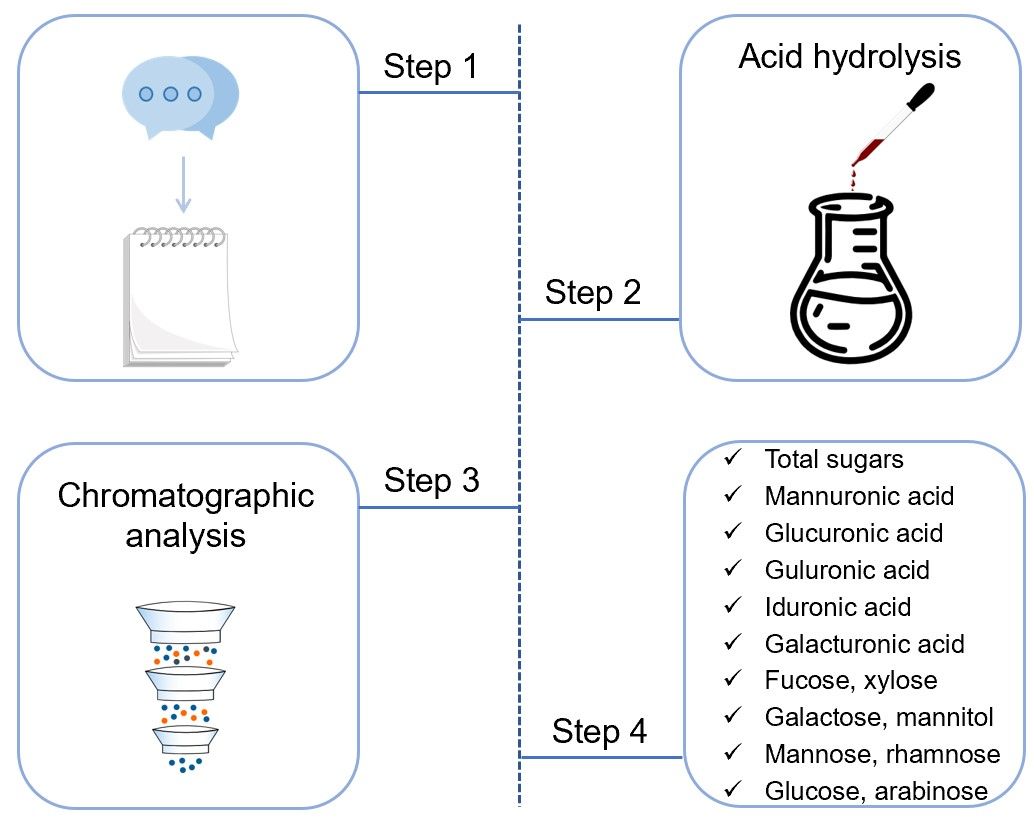Seaweed Simple Sugar Quantitative Profiling Service
Your Reliable Partner For Seaweed Carbohydrate Analysis
Seaweed carbohydrate analysis is essential to properly assess the potential of seaweed for biotransformation. At Creative Biolabs, we provide an accurate and precise seaweed carbohydrate (simple sugars) analysis service by reliable, analytical systems to help our clients better understand the carbohydrate content of seaweed and accelerate applied research. We have extensive experience in analyzing a wide range of components in Seaweed and other Biomass. We are also ready to help our clients with a variety of questions.
Seaweeds contain a variety of carbohydrates, including glucose, galactose, mannose, and various glucuronic acids. The composition and content of these carbohydrates vary in different types of seaweeds. Currently, there are more methods for detecting various types of carbohydrates. We use ion chromatography for rapid and reliable characterization of seaweed carbohydrates. It is verified that our optimized assay has the advantages of fast separation speed, high resolution, good separation effect, good reproducibility, etc., and the method applies to many types of samples.
-
Carbohydrate analysis process
-
Pretreatment of samples: Samples are subjected to acid hydrolysis to break down carbohydrates.
-
Dilution of hydrolyzed products: The hydrolyzed products are diluted and put into the chromatographic system for detection.
-
Chromatographic analysis: The various types of sugars in the diluted hydrolyzed product are quantitatively analyzed by the ion chromatography system.
-
The results we deliver
-
Total sugars content
-
Mannuronic acid, glucuronic acid, guluronic acid, galacturonic acid, and iduronic acid content
-
Fucose, mannitol, mannose, xylose, galactose, rhamnose, glucose, and arabinose content
 Fig.1 Flowchart for seaweed carbohydrate analysis.
Fig.1 Flowchart for seaweed carbohydrate analysis.
Features of Seaweed Carbohydrate Analysis Service
-
Highly sensitive detection method: Our seaweed carbohydrate analysis method is highly sensitive, convenient, and quantitatively analyzes a variety of monosaccharides and glyoxalates.
-
Customer demand first: We take clients as the main focus, according to client demand comprehensive analysis, designing the appropriate experimental program.
-
Technical guarantee: We have professional technical support, and guarantee strong, thoughtful, and timely service support, at any time for clients to answer any questions.
Creative Biolabs has many years of experience in analyzing seaweed components. Based on optimized ion chromatography we achieve rapid characterization and quantification of all types of carbohydrates in seaweed samples. In addition to carbohydrates, we also analyze Amino Acids and Fatty Acids in seaweed. Please feel free to contact us for more information on the analysis of carbohydrates and other components of seaweed, if you are interested in this area or need it.
Published data
Carbohydrates from seaweeds are a nascent material resource for biofuels and the manufacture of high-value carbohydrate products. This study shows us a reliable method for analyzing seaweed carbohydrates. The researchers used different high-performance anion exchange chromatography (HPAEC) methods to compare the monosaccharide composition of brown seaweed samples under different treatments. Ultimately, the two-step acid hydrolysis treatment was found to be the best method for quantitatively analyzing the carbohydrate composition of brown seaweeds. All the sugar alcohols mannitol and neutral sugars present could be quantified by HPAEC with pulsed current detection (PAD). This study provides theoretical and data support for the optimization of seaweed carbohydrate detection methods.1, 2
FAQs
Q1: Which carbohydrates do we usually analyze in seaweed?
A1: Seaweed carbohydrates include a variety of carbohydrates, including some polysaccharides, glucuronic acid, and so on. We mainly break down the carbohydrates and then analyze the content of glucose, galactose, mannose, fucose, some glyoxalates, and so on. The content and composition of these carbohydrates may vary in different seaweed species.
Q2: What methods are used for seaweed carbohydrate analysis?
A2: Various methods are commonly used for seaweed carbohydrate analysis, including enzyme analysis, ion chromatography, gas chromatography, spectrophotometry, and so on. The choice of method depends mainly on the specific type of carbohydrate to be analyzed and the objective of the analysis.
Customer Review
Fast and Accurate Quantification
"We have been making somewhat slow progress lately in analyzing compositional changes in seaweed samples under different treatments. Working with Creative Biolabs was a turning point for us. Their seaweed carbohydrate analysis service was very efficient. They provided us with fast and accurate quantification of carbohydrates in a variety of seaweed samples, which greatly reduced our research time."
Satisfactory Quality of Work
"We were very satisfied with the professionalism, work efficiency, and data quality at Creative Biolabs. After understanding our needs, they quickly developed a detailed plan for the analysis of seaweed carbohydrates. They also contacted us and updated us on their progress during the analysis process to ensure that our needs were accurately met. We were confident that we would use their seaweed carbohydrate analysis services to accelerate our research in the future."
References
-
Manns, Dirk, et al. "Methodology for quantitative determination of the carbohydrate composition of brown seaweeds (Laminariaceae)." RSC Advances 4.49 (2014): 25736-25746.
-
Under Open Access license CC BY 3.0, without modification.
For Research Use Only.
Related Services

 Fig.1 Flowchart for seaweed carbohydrate analysis.
Fig.1 Flowchart for seaweed carbohydrate analysis.

